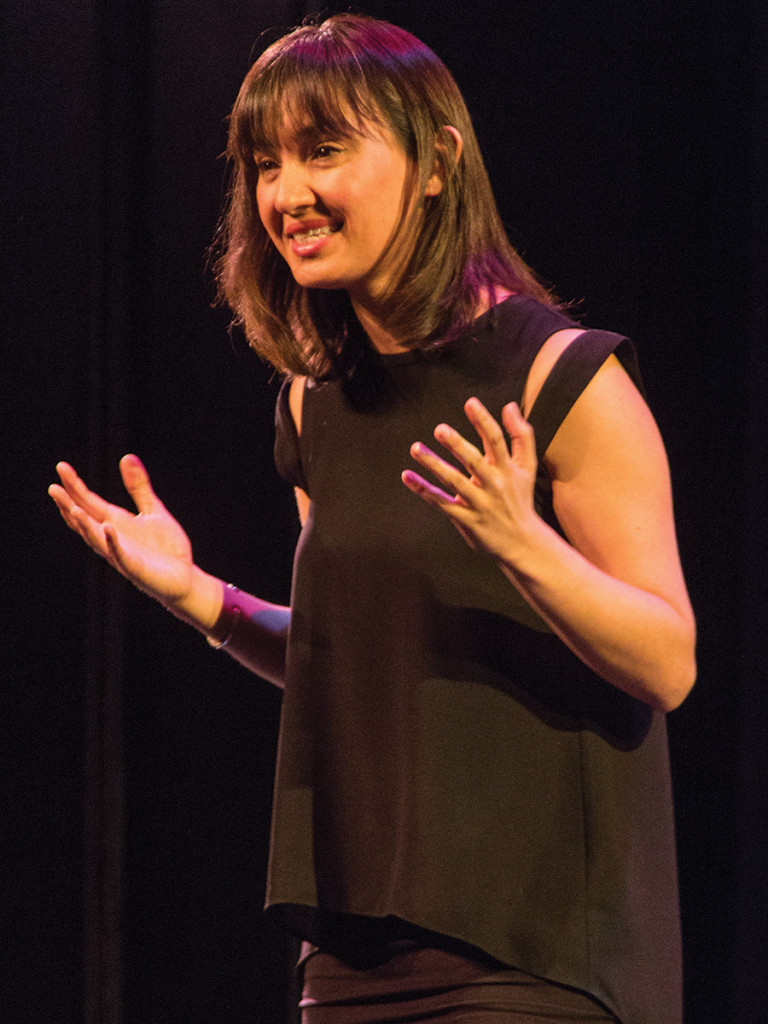
Trigger Warning: This article contains content relating to sexual violence and sexual assault.
In a pitch-black theater and a single light illuminating her, Heather Marlowe stood and gazed at the audience, not to command attention, but to start a conversation about her experiences with rape
—bringing to the subject a candid honesty and gallows wit.
Performer, playwright and activist of “The Haze”, Marlowe constructed her solo tragicomedy while waiting two years for the San Francisco Police Department to process her rape kit, initially with the goal to display the mishandling of her sexual assault case. Though as the performance morphed and formed, she realized something.
“This doesn’t just happen to me, but that it’s going on to the tune of hundreds and thousands of untested kits … in the Bay Area,” Marlowe said.
The performance and Q-and-A was arranged by ASUCR Chancellor’s Committee on Sexual Harassment and Sexual Violence Prevention whose goal this year is to educate the UCR student body. After watching Marlowe perform, committee chair and ASUCR president Ashley Harano commented that “The Haze” demonstrated nuances about sexual violence many do not know. One such nuance Harano specified was that “a lot of people experience that out-of-body experience where you either don’t want to talk about sexual assault or you are a survivor and you find a way to cope and normalize it when sexual assault is not normal and is a crime.”
Marlowe begins, continues and ends her performance with a balance of playfulness and bluntness. Never did it feel like parts were meant to be punctuated with a joke or an exaggerated gesticulation. As she defined the haze as “very dissociative and dreamlike” with her hands flowing back and forth and her gaze trailing away, Marlowe held herself with an ease the audience could lull into, but could shock them the next second.
After holding back laughter while describing the first time she met her 15-years-older ex-boyfriend Mitch, she recalled — offhandedly as if it was an extra anecdote to her conversation — that he reminded her of her father. Specifically childhood memories, as Marlowe noted, “like when my father came into my bedroom at night.” Then moved back to talking about Mitch.
Marlowe treated major plot points in her performance, including her rape, her rape kit and investigation, with an honesty coupled with jokes about the flowing, purple muumuu she was raped in and awkward interactions with the doctor conducting her rape kit. But, with many muffling their short laughs, audience members were left wondering if it was appropriate for them to find humor in rape. If rape can even be ironic.
After leaving a phone message for the investigator, Marlowe, at this point weary with the lack of an investigation, delivered a dark criticism on rape culture: “How do I get people to care (about my rape)? I know! What if everyone got raped. If men got raped, if women got raped and if children got raped. Okay, right. I think statistics are women and children get raped a lot more, so yeah if way more adult men got raped, particularly police inspectors and sergeants and police chiefs got raped, then I don’t know, somebody might return my call.”
Although first-year art history and administrative major Carla Villamil was taken back, she commended it. “It was very raw, but very honest.”
“She wasn’t afraid to state out what she was feeling, which … I found refreshing at the same time … I think it was to grab your attention and to just get her case out there about what exactly was happening to her and what was happening to other people at the same time,” she said. Villamil pointed to Marlowe’s willingness to act out the responses of her friends and loved ones to her rape as not only off-putting, but compelling.
Her friend, first-year pre-business major Lynda Amador agreed, stating, “She talked to us … She was just like, ‘look this is what happens and I want you guys to know this happens to a lot of people’ and so this is my process of being an activist for it.”
While “The Haze” has received critical attention at the national level as a piece of activism, Marlowe never meant it to be. As more audience members connected with her story, the performance and Marlowe took greater roles in the activist community from going to court to participating in the Q-and-A. She demonstrated concern at the local level, bringing up that even the Riverside Police Department holds a high number of untested rape kits.
No matter how harrowing her story is, Marlowe uses it to shed light on rape cases that are often overlooked by the public and police. “If it were me and I had to go repeat my story over and over, I guess you get a tough skin to it, but at the same time I probably get a little emotional,” Amador mused. “I thought it was really cool that even if she maybe felt the pain again, she was able to hide it pretty well for the work of art.”
As I sat across from Marlowe after her performance for a brief interview, a final line from the Haze haunted the back of my mind.
“But, I’m still here and I keep going.”








